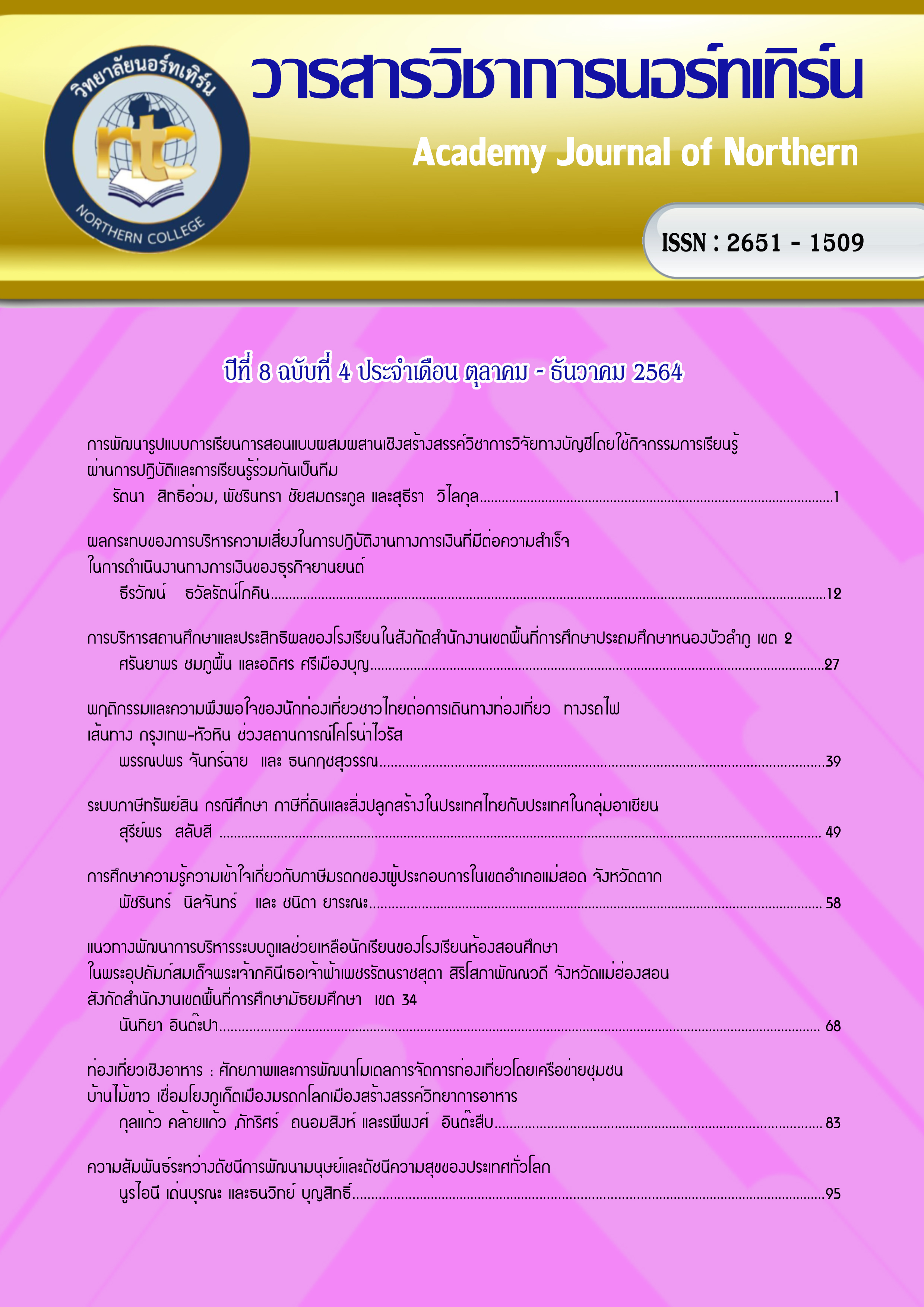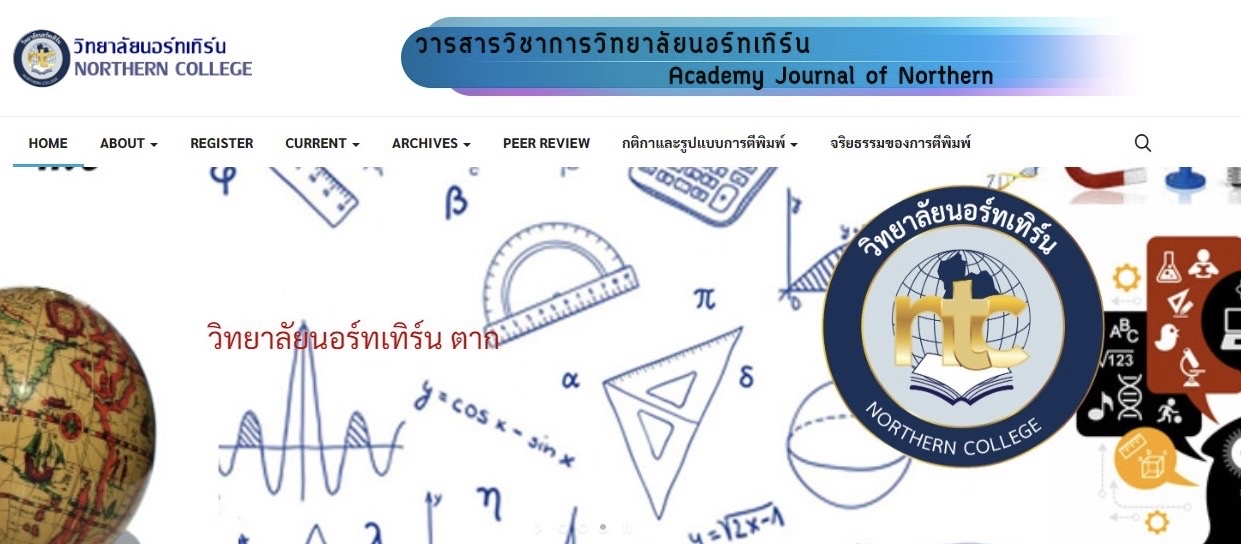Gastronomy Tourism : Potential and development of tourism management model by Ban Mai Khao Community network linking Phuket the creative city of Gastronomy by UNESCO
Keywords:
Potential, Development of tourism management model, Gastronomy TourismAbstract
This research aims to study the potential of food tourism in Ban Mai Khao community Phuket Province and developing a food tourism management model connecting Phuket the creative city of Gastronomy by UNESCO with the participation of the Ban Mai Khao community network. It is a qualitative research. by bringing the issues from the group meeting in-depth interview come to a conclusion in accordance with the research objectives defined and Data were analyzed by content analysis method. The results showed that The community has the potential to be able to adopt existing lifestyles and cultures. Come to engage in various food tourism activities and be able to connect activities with Phuket the creative city of Gastronomy by UNESCO. Community-based food tourism management methods community knowledge from community leaders and systematic management processes can be developed as a model for food tourism management with the participation of community networks and as a model for tourism management to connect Phuket Town which is a creative city in food science by UNESCO.
References
กรมพัฒนาธุรกิจการค้า. (2562). ธุรกิจร้านอาหารบทวิเคราะห์ธุรกิจ ประจำเดือน กุมภาพันธ์ 2562. สืบค้นเมื่อ 3 ตุลาคม 2564. https://www.dbd.go.th/download/document_ file/Statistic/2562/T26/T26_201902.pdf
โครงการ The Creative Community of Gastronomy Tourism Network กรณีศึกษาชุมชนบ้านไม้ขาว จังหวัดภูเก็ต. (2564). Model เครือข่ายชุมชนเพื่อการเรียนรู้ด้าน “การท่องเที่ยวเชิงอาหาร” กรณีศึกษา ชุมชนบ้านไม้ขาวภูเก็ต. หลักสูตรปรัชญาดุษฎีบัณฑิตสาขาการจัดการนันทนาการ การท่องเที่ยวและกีฬา มหาวิทยาลัยศิลปากร.
จักกฤษณ์ วังราษฎร์. (2561). โครงการหน้าต่างสู่การท่องเที่ยวล้านนา (Lanna Tourism Enclave) ประเด็นการท่องเที่ยวเชิงอาหารและอาหารสุขภาพ. ศูนย์วิจัยและพัฒนาการท่องเที่ยว สถาบันวิจัยสังคมมหาวิทยาลัยเชียงใหม่.
จุฑามาศ วิศาลสิงห์. (2562). Gastronomy Tourism การกระจายรายได้สู่ “ฐานราก” สืบค้นเมื่อ 2 ธันวาคม 2562. จาก https://www.prachachat.net/tourism/news-317059
ภัทรพร พันธุรี. (2558). การจัดกิจกรรมการท่องเที่ยวเชิงอาหารโดยผ่านประสบการณ์ของนักท่องเที่ยวในประเทศไทย. วารสารเทคโนโลยีภาคใต้. สืบค้นเมื่อ 6 ธันวาคม 2562. จาก https://www.tco-thaijo.org/index.php/journal_sct/issue/view/7538.
โตมร สุขปรีชา. (2560). Food Tourism 2.0. TAT Review Magazine, 3(1) : 8-13.
บัณฑิต อเนกพูนสุข. (2560). Food on the Move. TAT Review Magazine, 3(1) : 8-13.
บุษกร เชี่ยวจินดากานต์. (2561). เทคนิคการวิจัยเชิงคุณภาพแบบกรณีศึกษา. วารสารศิลปศาสตร์ปริทัศน์ ปีที่ 13 ฉบับที่ 25 มกราคม - มิถุนายน 2561. หน้า 103-118.
ถวิลวดี บุรีกุล. การมีส่วนร่วม : แนวคิดทฤษฎีและกระบวนการ.เอกสารประกอบการศึกษาดูงานของคณะกรรมาธิการพัฒนาการเมืองและการมีส่วนร่วมของประชาชน วุฒิสภา วันอังคารที่ 17 มิถุนายน 2551 ณ สถาปันพระปกเกล้า. 2551. หน้า 6-8.
วันชัย วัฒนศัพท์. (2545). คู่มือการมีส่วนร่วมของประชาชนในการตัดสินใจของชุมชน. พิมพ์ครั้งที่ 1. กรุงเทพฯ: โรงพิมพ์ศิริภัณฑ์ออพเซท. หน้า 1-7.
ศูนย์ข้อมูลเพื่อพัฒนาการท่องเที่ยวเชิงนิเวศ. (2559). รูปแบบกิจกรรมในแหล่งท่องเที่ยวเชิงนิเวศ. สืบค้นเมื่อวันที่ 3 ตุลาคม 2564. จาก http://conservation.forest.ku.ac.th/ecotourdb/Cgi-bin/ARTICLE/ecotour_tat.asp.
องค์การบริหารการพัฒนาพื้นที่พิเศษเพื่อการท่องเที่ยวยั่งยืน (องค์การมหาชน). (2559). ท่องเที่ยวเชิงอาหาร. กรุงเทพฯ : บริษัทโคคูน แอนด์ โค.
World Tourism Organization. 2012. Global report on food tourism : AM report volume four. Madrid, Spain: Author.
Downloads
Published
How to Cite
Issue
Section
License
Copyright (c) 2023 Academy Journal of Northern

This work is licensed under a Creative Commons Attribution-NonCommercial-NoDerivatives 4.0 International License.







